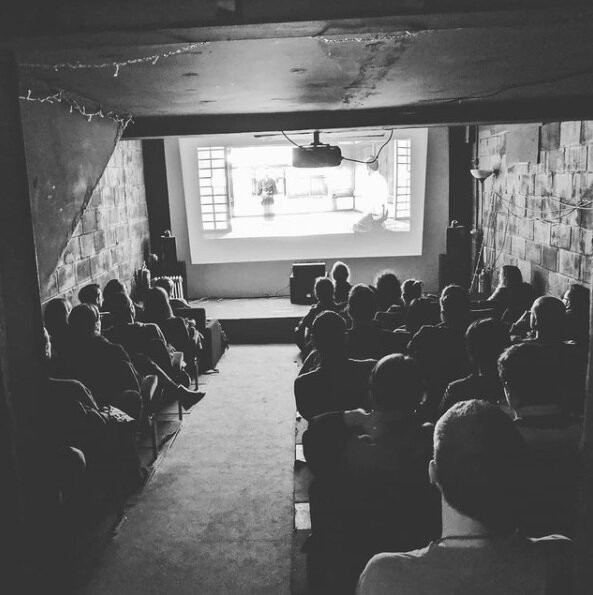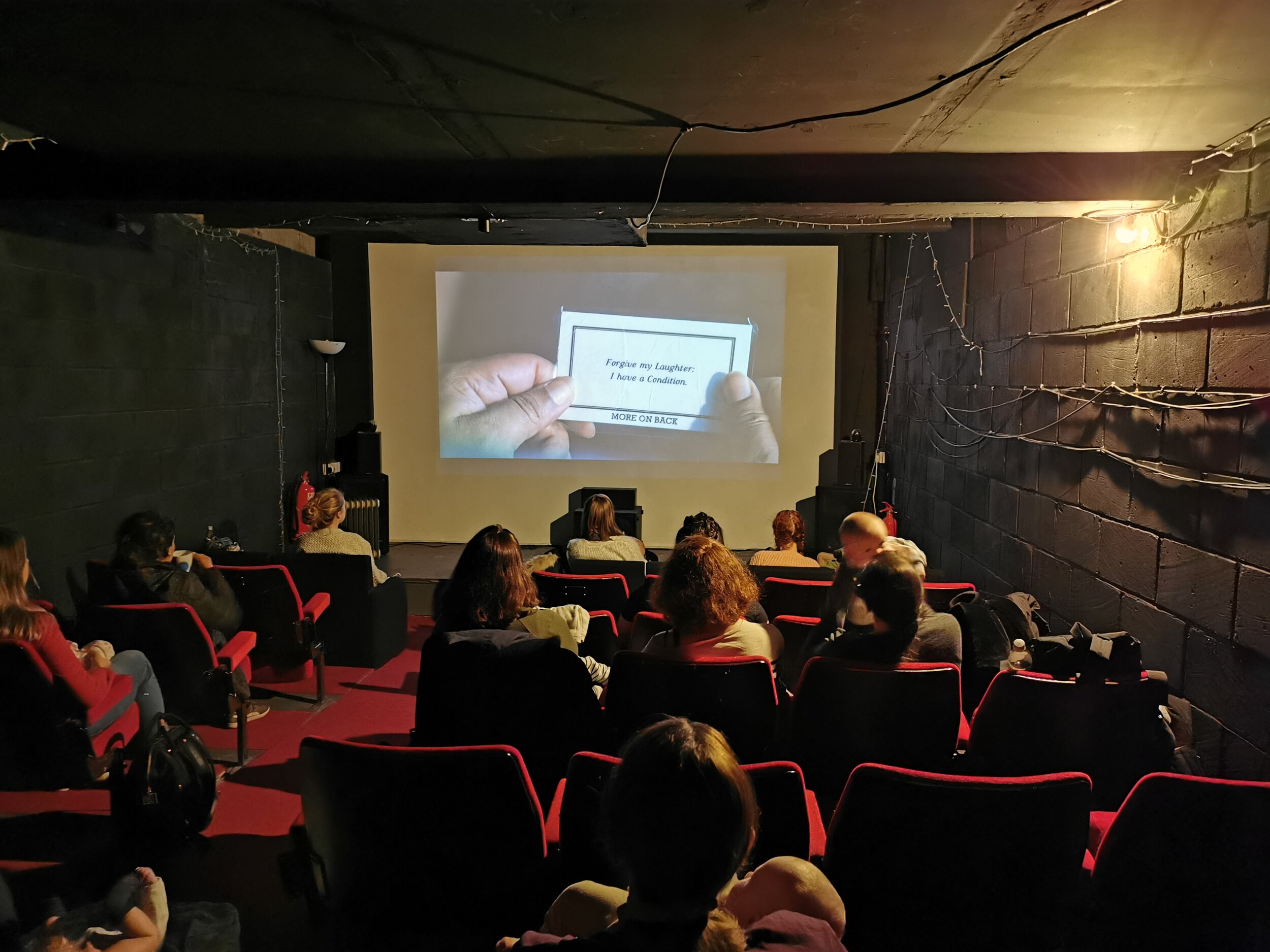DEPTFORD BROADWAY MEMORIES
Last week was a momentous one for the cinema. We finally moved out of our beloved venue on Deptford Broadway. It was a space that we built from scratch, with many days of DIY toil to make it the cosy and intimate place we all loved. Both audiences and volunteers spent many happy hours within its walls watching a diverse collection of hand-picked films. We will all miss our cinema so much.
But our story does not end here. We are now seeking a new cinema venue in Deptford. In the meantime, we will be programming pop-up films in the community, plus presenting a plethora of fascinating film-related content to watch, read and listen to here on our website.
A heartfelt thank you to everyone who has supported us in the past five years, through the good times and more recent hard times. We promise to keep you posted as to all the exciting new developments.
So, as the lights dim, we will be remembering some really wonderful times through a series of Journal posts by volunteers, past and present. And readers, maybe you too have some good memories of the cinema - a movie date, an awe-inspiring film or a great post-film discussion. Please send a few sentences, marked ‘DC Memories’ to info@deptfordcinema.org - and your reminiscences will be published here. We would love to hear from you.
Samurai Sundays
The picture above was taken from the projection booth at the beginning of the first film I ever programmed at Deptford Cinema. The film was Masaki Kobayashi’s masterpiece, HARAKIRI, as part of my Samurai Sundays strand at the 2019 London East Asia Film Festival. It was an emotional and proud event for me because Japanese cinema, and samurai films in particular, are a real passion of mine and it was so great that other people came to share in that and enjoy the film.
I’ve also really enjoyed the podcast episodes I’ve appeared on, the three Zoom Quiz Nights hosted by Nora, Sam, Adriana and myself, and the lovely time we all had last Christmas when we took over Jenny’s café and then back at the cinema for the party afterwards.
Peter
Ambassadors and Babes-in-Arms
It was a quiet night. The film had started, and I was minding the bar on my own. A woman opened the front door. "Can I have a cab?" she asked. She thought our cinema was a mini cab office! And it wasn’t the first-time people got confused when they saw the front window of the cinema. Another guy came in and thought it was just a café. When I organised an Indonesian film festival, the Indonesian ambassador who was coming to the opening night had to turn around in his car several times to find us. One of the ambassador’s staff finally made it and then had to ‘guide’ the ambassador to the cinema. But it was a good festival. The Indonesian delegation brought lovely food for the opening night. After the film, members of the audience were invited to a free feast!
Just before we closed due to the pandemic, we organised our first ever babes-in-arms screening for mums, dads and babies! It was a lovely morning with awesome parents and adorable babies enjoying The Joker.
Lenah
The Accidental Anarchists
The story of how Deptford Cinema came to exist is probably well known by now. One thing that hasn’t been talked much about was how we started to programme events and run the cinema in the early days.
True to our ethos of being a non-hierarchical space we used to let anyone and everyone come and use the cinema for films and events. We still do, but with a difference - we have some strict training and rules and procedures now. At the time we had very basic and relaxed guidelines on how to screen films, how to run the bar, etc. Making the cinema accessible to everyone was at the forefront of our mission.
However, this relaxed attitude brought problems too, such as clashes with schedules, double bookings, events appearing on our calendar with no one knowing who was running them, sometimes programmers had to cancel screenings but forgot to cancel the film licenses, etc. It was clear that we needed a more organised approach to programming events, thus our loose guidelines got tightened and strict procedures for running the bar were introduced. If procedures were too complicated, they were revised and streamlined.
To me, the way the cinema progressed was like the evolution of a society. At first, everyone was happy going along doing things in their own way. When problems arose, it was necessary to introduce rules and procedures. In a society this would be akin to introducing a constitution and laws. However, we didn’t introduce a body to enforce the laws or a hierarchy. We still maintained that the running of the cinema should be carried out in a non-hierarchical way.
One day, one of our volunteers screened The Accidental Anarchist, a film by Carne Ross, and I was asked to join him for a Q&A after the screening. Carne Ross was a diplomat who believed western-style democracy was the best form of government. However, after the Iraq war he became disillusioned and resigned. In The Accidental Anarchist he embarks on a quest to find a better way of doing things as he transforms from a government official to an anarchist.
For me, non-hierarchy represents the spirit of the cinema. After seeing the film, I was convinced we were anarchists.
It is worth noting here that I’m using the word “anarchism” not in the derogatory sense as it is often used today in current political discourse, but in the sense of a political theory that advocates the substitution of organised hierarchical government for voluntary cooperation among individuals.
After the screening and during the Q&A session with Carne Ross we answered a number of questions from the audience. I felt very privileged to sit next to Carne and share our limited experience of anarchism in the running of our cinema with him and our patrons.
Of course, most of the volunteers probably wouldn't consider themselves anarchists - especially with the negative connotations that word has nowadays, but I always think we, the volunteers, made a magnificent decision of running the cinema in a non-hierarchical way, to make it a place that can be accessible to all.
The success of the cinema is living proof that anarchism works. Even though we never set out to be anarchists by design, we became so by accident.
Carlos
Nordic Film Nights
When I first joined Deptford Cinema as a volunteer, I only had a vague idea of curating some form of a programme of films from the Baltic countries. It took some time and a lot of help from very friendly long-term cinema volunteers to get me to the point of thinking about the practicalities of setting up a programme and looking for potential films to show. I realised quite quickly that it was not going to be possible to put together a programme solely of films from the Baltic countries due to licensing costs and the availability of films, and so I decided to widen the idea to encompass all of Scandinavia. Thus, the Nordic Film Nights season was born, and it turned out to be quite popular.
I can't pick my favourites of that season as I liked them all. I was just glad that there were people coming to see those films. Some of the more popular titles were the Swedish film, Border, Danish films The Guilty and The Hunt and a Swedish film, A Man Called Ove. But each film seemed to bring in a slightly different audience. I was particularly pleased to be able to show an Estonian-Georgian collaboration, the film Tangerines and a Latvian film, Mother I Love You, as two great representations of excellent film-making from the Baltic countries.
Nordic Film Nights will continue as soon as Deptford Cinema finds a new permanent home. If readers have any ideas/wishes/recommendations of titles to be included, please feel free to get in touch with me by emailing info@deptfordcinema.org
Annika
Five Years of DIY
Most of my fondest memories of Deptford Cinema aren’t of events or screenings but of times when the volunteer body have been together. I remember a weekend building session in maybe summer 2015 or 2016 and there must have been 15/20 volunteers getting stuck in, working on multiple projects: laying the wood flooring in the bar, tiling the bathrooms and building what would later become the projection booth. It was a perfect example of the flat structure that makes Deptford Cinema so special; nobody was stuck with the rubbish job and the people with the knowledge of how to do certain things, for example tiling a bathroom, were making sure the other volunteers were learning and sharing in that skill. Builds were always the best opportunity to get to know your fellow volunteers better as you’re shoulder to shoulder figuring out how to plumb a sink properly - all getting equally soaked in the process.
Sam
Welcome to Tromaville
Lloyd Kaufman, his wife and Troma Entertainment entourage joined us for a wonderful Troma-tastic event in early 2019. He signed a poster calling me, The Goddess of Anarchic Cinema! He loved everything that Deptford Cinema stands for, so much so that he even promoted our fundraiser.
EXCLUSIVE: He was in the bar at Deptford Cinema when he received the text from James Gunn offering him a cameo in the next Guardians of the Galaxy film.
I loved the fact you could just stumble into the cinema most evenings and have a wonderful time. Deptford Cinema has always been more than a community; it's a family and will always be near to my heart, however far away I live.
Viki



